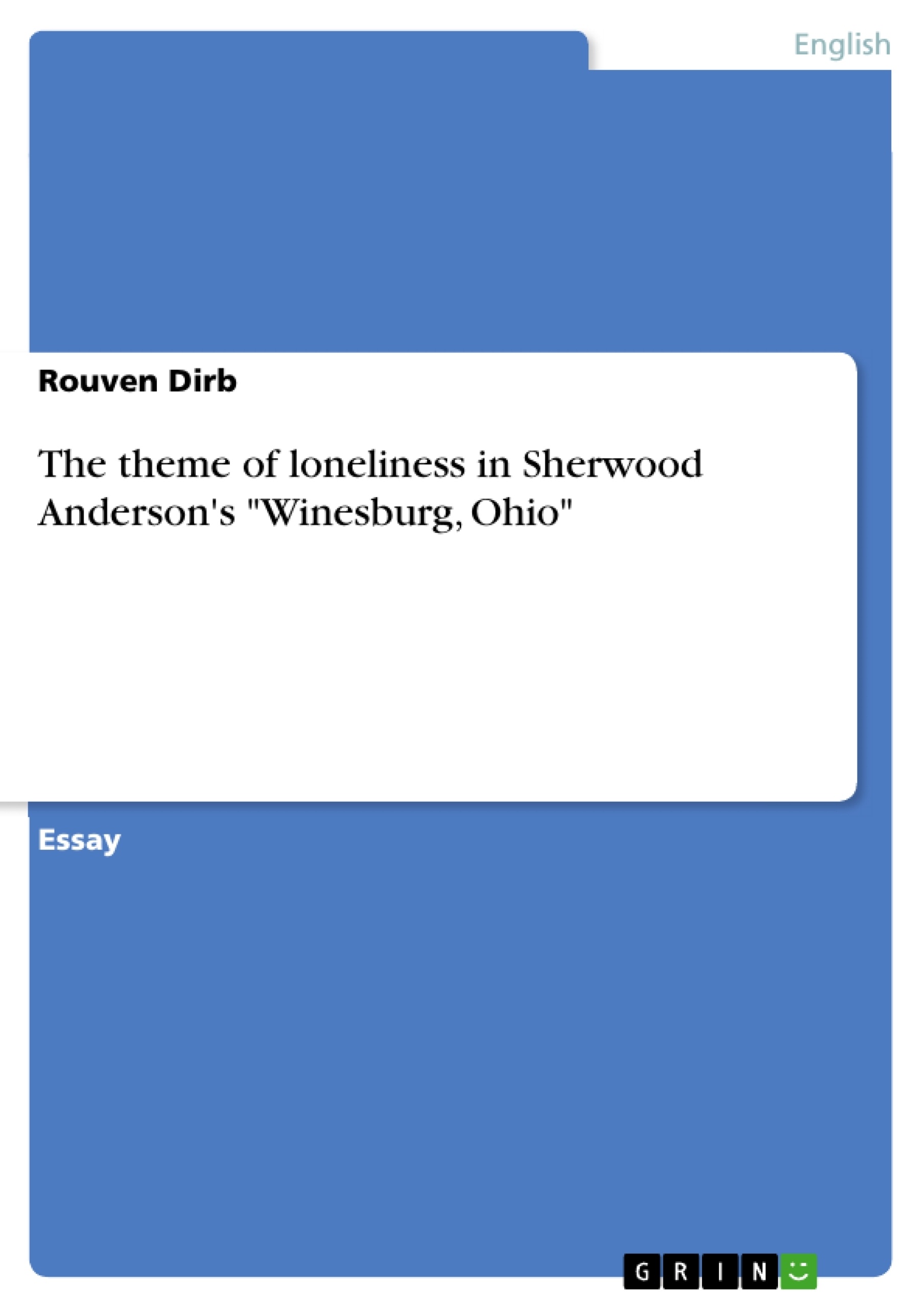Excerpt
The theme of loneliness in Sherwood Anderson's “Winesburg, Ohio”
1) Introduction
Sherwood Anderson's short story cycle “Winesburg, Ohio” was first published in 1919. The cycle contains 25 short stories, including the outstanding first story “The Book of the Grotesque” and a four-part tale called “Godliness”. The narration in this cycle is authorial with a shifting focalization depending on who is the protagonist in the stories. The most important character, who appears in one form or another in every short story of the collection, is the young journalist George Willard. He and of course the city of Winesburg itself are the main links between the short stories, although not every short story takes place in Winesburg. However, if the story is not located in the city, Winesburg is at least mentioned. The setting of the cycle plays an important role in the understanding of the theme of loneliness. Winesburg is described as a sleepy mid- western town in the United States. Although one can say that everyone knows everyone in a small town, it is different in the case of Winesburg. The people know each other superficially but don't know the other person's true feelings.
I chose to analyse four stories of the cycle in terms of a very important recurring theme
– loneliness - because I think that this theme, although the cycle was written almost 100 years ago, has not lost a bit of actuality. Furthermore, I see this essay as a continuation to my first essay, which dealt with the themes of “Winesburg, Ohio” in comparison to Joyce's “Dubliners”. In this essay I will dive deeper into the theme of loneliness than I did before.
2) The theme of loneliness
One of the most present themes to be found in the collection is the theme of loneliness. The prologue-like opening “The Book of the Grotesque” gives the reader a first look of what makes the people in the stories lonely:
“They were all grotesques. All of the men and women the writer had ever known had become grotesques. The grotesques were not all horrible. Some were amusing, some almost beautiful, and one, a woman all drawn out of shape, hurt the old man by her grotesqueness.” (p. 22 – 23).
The grotesque, which is mentioned in the quote, is the people's obsession with certain ideas and manners as well as their inability to express feelings. The characters of the following short stories are even so obsessed with their ideas, that the old author in the prologue, who is supposedly George Willard, describes them as grotesques. “It [is] the truths that [make] the people grotesques” (p. 24), that turn them more and more away from their social lives and make them outsiders to society, who are unable to share their feelings and ideas with anyone else but themselves. Especially interesting about the old author's definition of the grotesque is the fact that he, who has collected all the stories over the years and wants to write a book about them, has never managed to write the book. He becomes so obsessed with his idea of the people's grotesqueness that he finally wants to sit down and start to write the book, but realizes shortly afterwards that he would become too obsessed and that the writing would turn him into a grotesque himself.
“The subject would become so big in his mind that he himself would be in danger of becoming a grotesque. He didn't, I suppose, for the same reason that he never published the book. It was the young thing inside him that saved the old man.” (p. 24).
The next story I am going to analyse in terms of the theme of loneliness is the first real story in the cycle entitled “Hands”. It is the story of Wing Biddlebaum, a former school teacher, who “forever frightened and beset by a ghostly band of doubts, did not think of himself as in any way a part of the life of the town where he had lived for twenty years.” (p. 27). The only person Biddlebaum seems to have at least a bit of trust is young author George Willard: “In the presence of George Willard, Wing Biddlebaum, who for twenty years had been the town mystery, lost something of his timidity, and his shadowy personality […] came forth to look at the world.” (p. 28).
Wing Biddlebaum's obsession are his hands. It is said that “he [talks] much with his hands” (p. 28), and that they are “forever active, forever striving to conceal themselves in his pockets or behind his back” (p. 28). The people of Winesburg have paid attention to his hands “merely because of their activity” (p. 29) some time before he meets George Willard. His hands have become “his distinguishing feature, the source of his fame.” (p. 29).
His hands are not only the feature that make him grotesque, they are the reason for his loneliness as well. All these years he has been trying to hide his hands - and because he can not hide them – he hides himself from the world. This fact goes hand in hand with his past. In the city he has lived in before he was forced to move to Winesburg, he was accused of child molesting. His hands were “caressing the shoulders of the boys, playing about the tousled heads” (p. 31). More and more children accused him by saying “He put his arm about me [and] his fingers were always playing in my hair” (p.
- Quote paper
- Rouven Dirb (Author), 2010, The theme of loneliness in Sherwood Anderson's "Winesburg, Ohio", Munich, GRIN Verlag, https://www.grin.com/document/182850
Publish now - it's free






















Comments